备考2011高效学习方案英语高二册:unit 8 first aid
文档属性
| 名称 | 备考2011高效学习方案英语高二册:unit 8 first aid |
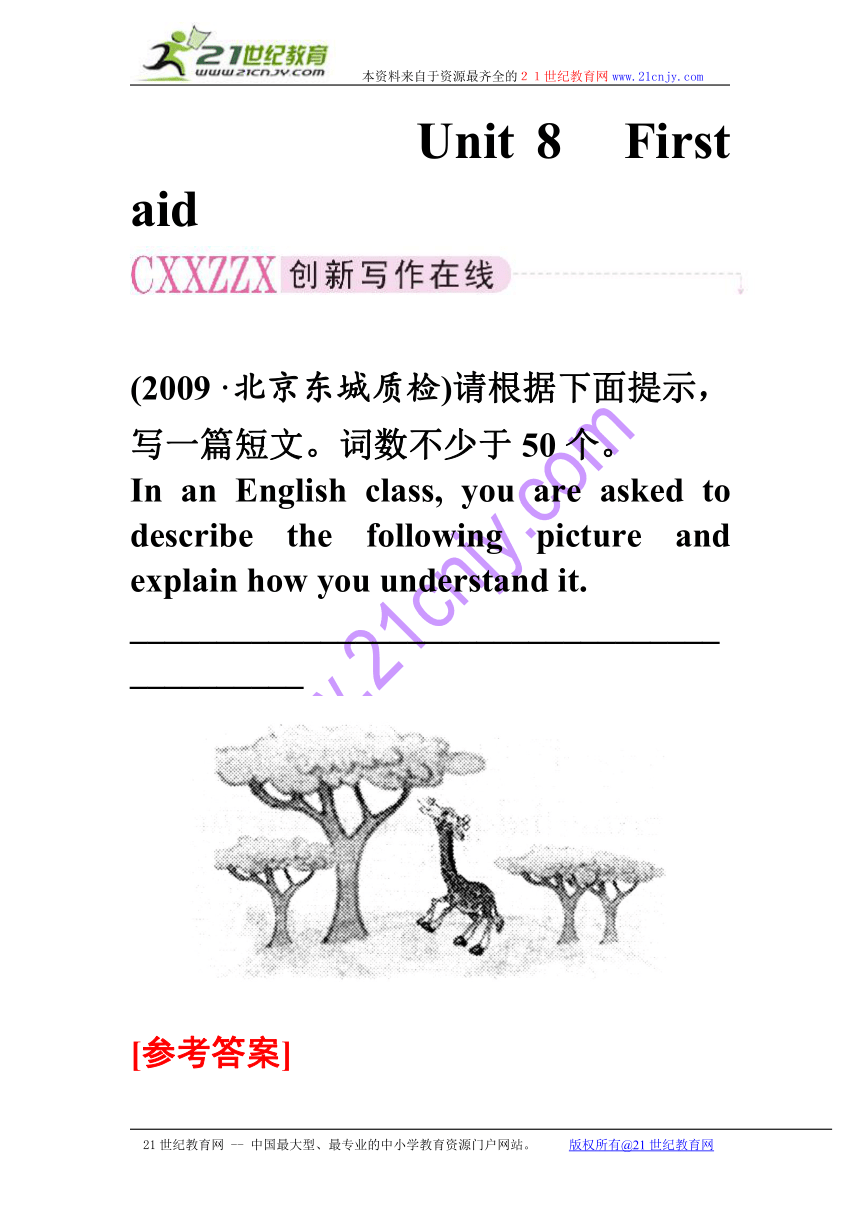
|
|
| 格式 | rar | ||
| 文件大小 | 424.2KB | ||
| 资源类型 | 教案 | ||
| 版本资源 | 人教版 | ||
| 科目 | 英语 | ||
| 更新时间 | 2010-12-14 00:00:00 | ||
图片预览

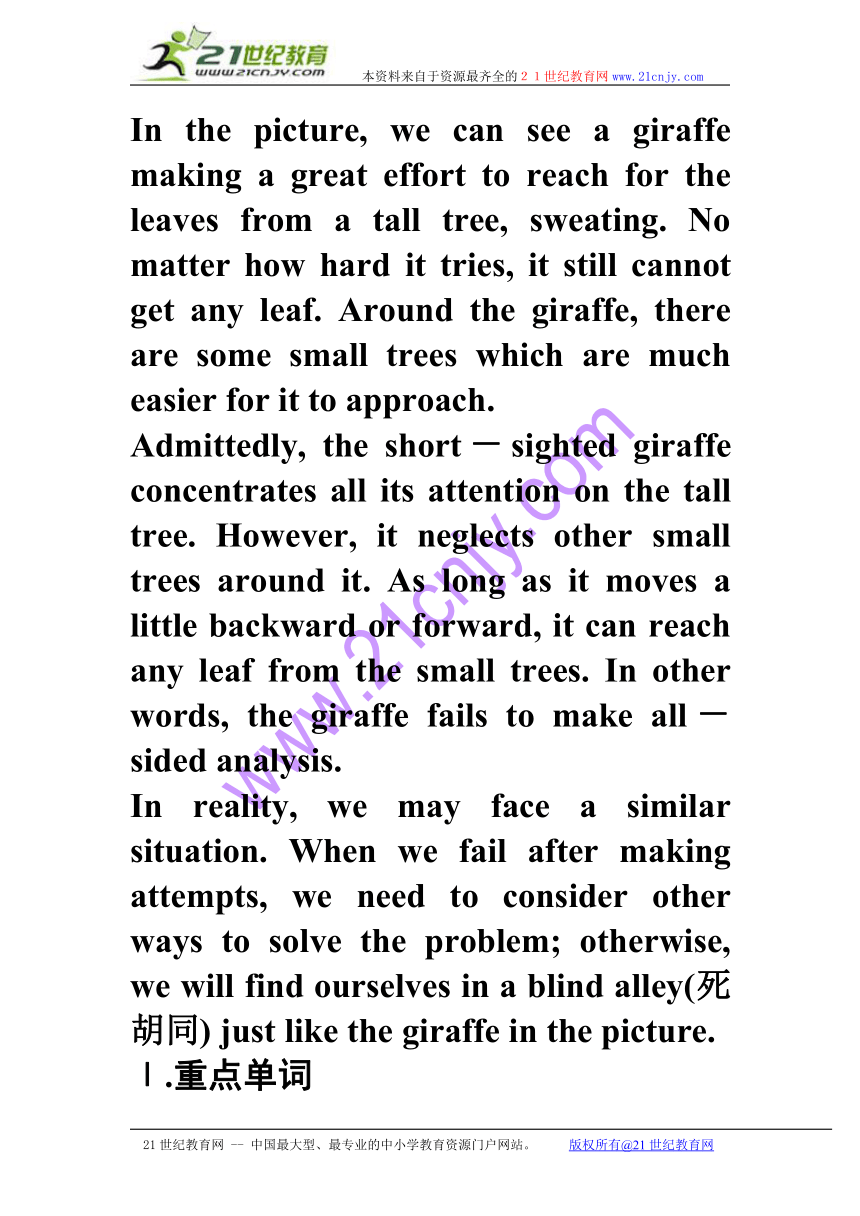
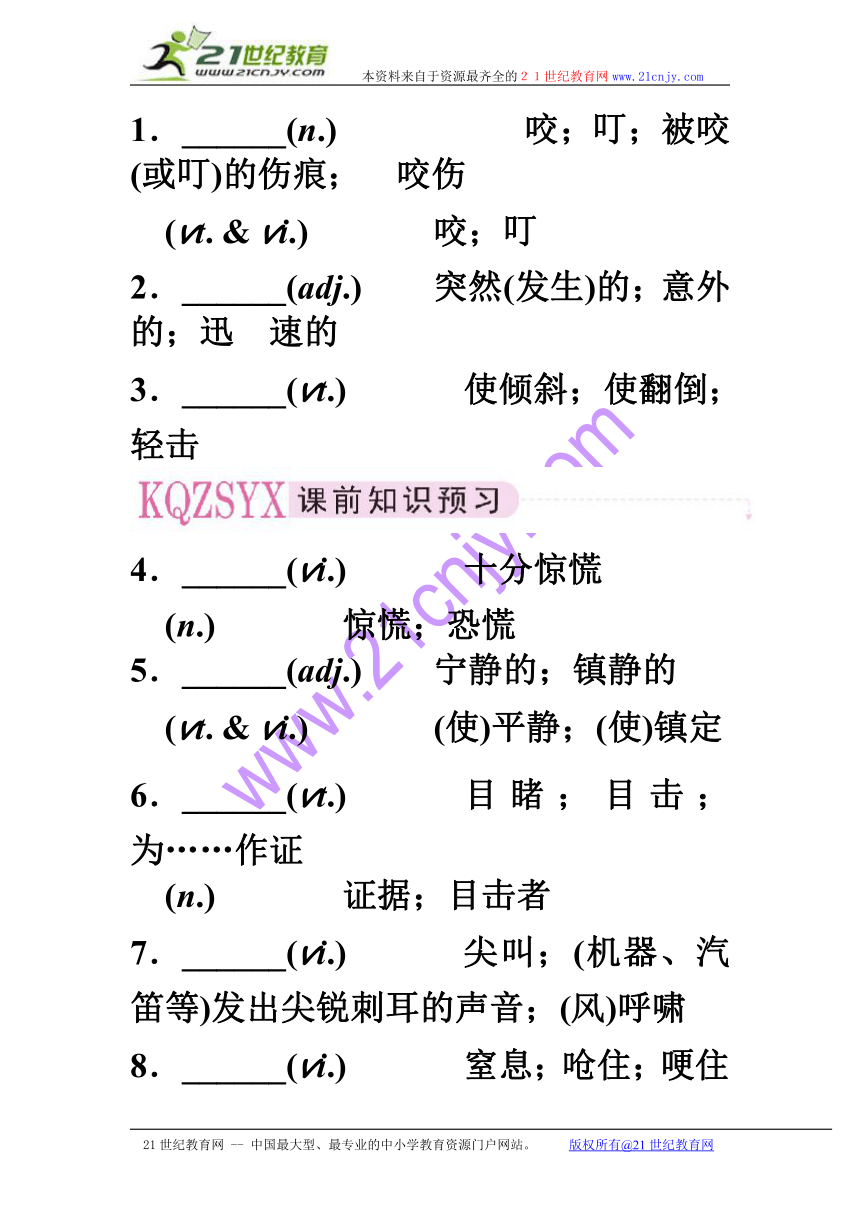
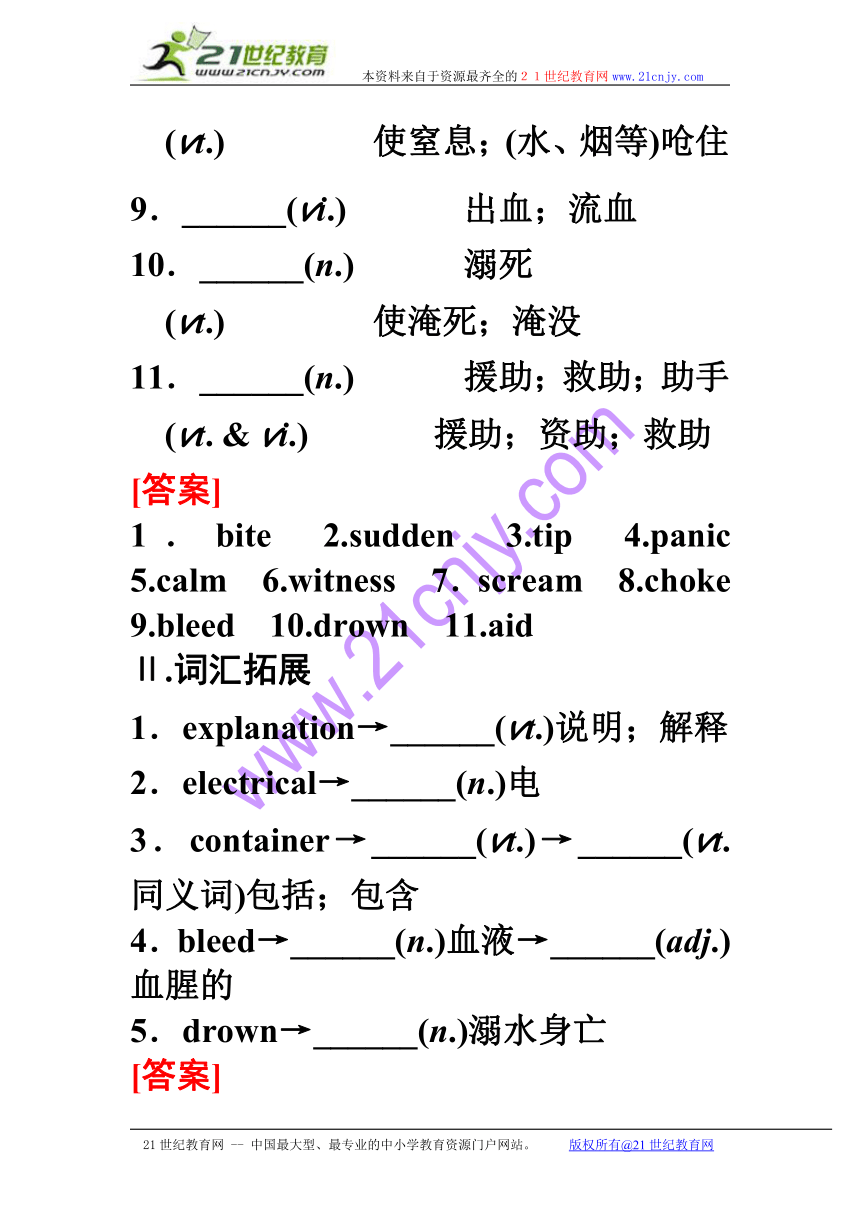
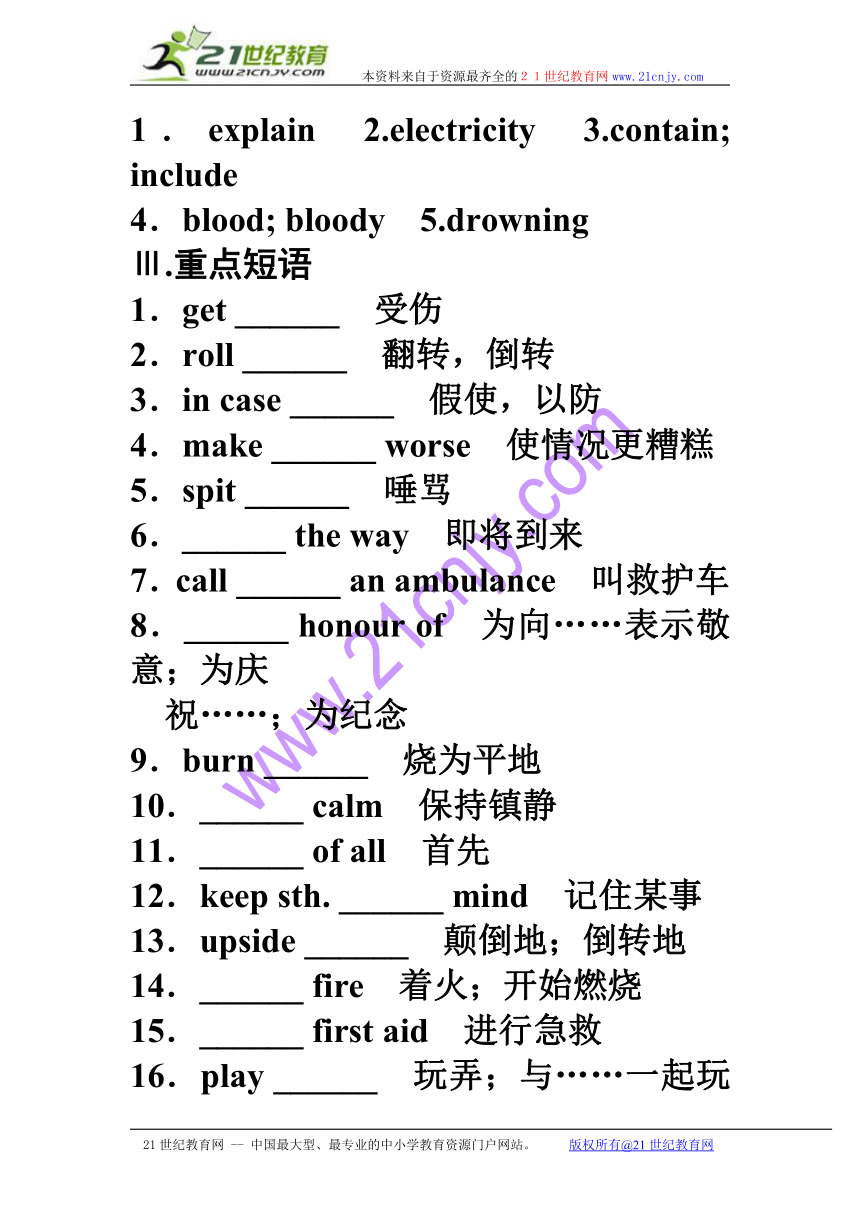
文档简介
本资料来自于资源最齐全的21世纪教育网www.21cnjy.com
Unit 8 First aid
(2009·北京东城质检)请根据下面提示,写一篇短文。词数不少于50个。
In an English class, you are asked to describe the following picture and explain how you understand it.
____________________________________________
[参考答案]
In the picture, we can see a giraffe making a great effort to reach for the leaves from a tall tree, sweating. No matter how hard it tries, it still cannot get any leaf. Around the giraffe, there are some small trees which are much easier for it to approach.
Admittedly, the short-sighted giraffe concentrates all its attention on the tall tree. However, it neglects other small trees around it. As long as it moves a little backward or forward, it can reach any leaf from the small trees. In other words, the giraffe fails to make all-sided analysis.
In reality, we may face a similar situation. When we fail after making attempts, we need to consider other ways to solve the problem; otherwise, we will find ourselves in a blind alley(死胡同) just like the giraffe in the picture.
Ⅰ.重点单词
1.______(n.) 咬;叮;被咬(或叮)的伤痕; 咬伤
(vt. & vi.) 咬;叮
2.______(adj.) 突然(发生)的;意外的;迅 速的
3.______(vt.) 使倾斜;使翻倒;轻击
4.______(vi.) 十分惊慌
(n.) 惊慌;恐慌
5.______(adj.) 宁静的;镇静的
(vt. & vi.) (使)平静;(使)镇定
6.______(vt.) 目睹;目击;为……作证
(n.) 证据;目击者
7.______(vi.) 尖叫;(机器、汽笛等)发出尖锐刺耳的声音;(风)呼啸
8.______(vi.) 窒息;呛住;哽住
(vt.) 使窒息;(水、烟等)呛住
9.______(vi.) 出血;流血
10.______(n.) 溺死
(vt.) 使淹死;淹没
11.______(n.) 援助;救助;助手
(vt. & vi.) 援助;资助;救助
[答案]
1.bite 2.sudden 3.tip 4.panic 5.calm 6.witness 7.scream 8.choke 9.bleed 10.drown 11.aid
Ⅱ.词汇拓展
1.explanation→______(vt.)说明;解释
2.electrical→______(n.)电
3.container→______(vt.)→______(vt.同义词)包括;包含
4.bleed→______(n.)血液→______(adj.)血腥的
5.drown→______(n.)溺水身亡
[答案]
1.explain 2.electricity 3.contain; include
4.blood; bloody 5.drowning
Ⅲ.重点短语
1.get ______ 受伤
2.roll ______ 翻转,倒转
3.in case ______ 假使,以防
4.make ______ worse 使情况更糟糕
5.spit ______ 唾骂
6.______ the way 即将到来
7.call ______ an ambulance 叫救护车
8.______ honour of 为向……表示敬意;为庆
祝……;为纪念
9.burn ______ 烧为平地
10.______ calm 保持镇静
11.______ of all 首先
12.keep sth. ______ mind 记住某事
13.upside ______ 颠倒地;倒转地
14.______ fire 着火;开始燃烧
15.______ first aid 进行急救
16.play ______ 玩弄;与……一起玩儿
[答案]
1.hurt 2.over 3.of 4.things 5.out 6.on
7.for 8.in 9.down 10.stay 11.first 12.in
13.down 14.catch 15.do/give 16.with
Ⅳ.重点句型
1.The most important thing to keep in mind when dealing with an emergency is to stay calm.
在处理紧急情况时,要记住最重要的是保持镇静。
2.We do our best to be careful and prevent bad things from happening.
我们应尽量小心防止意外发生。
Ⅴ.重点语法
The Subjunctive Mood 2(虚拟语气2)
Ⅰ.词汇聚焦
1.aid n. & v. 帮助,援助
[思维拓展]
with the aid of sb.在某人的帮助下
=with one’s aid
in aid of...为了……
aid sb. to do sth.帮助某人做某事
aid sb. in/with...为某事帮助某人
first aid急救
hearing aid助听器
teaching aids教具
[指点迷津]
aid与help
aid为正式用语,在日常生活中不多用;help含义较广,在日常生活中用的很多,几乎在所有用aid的地方均可用help代替,但在表示“救护”时,只可用aid。
①We should give some economic aid to them.
②I aided her to continue her study.
2.calm adj. 静的,平静的;沉着的,镇静的;n. 平静,无风;镇静;v. 使平静,使静下来
He asked his men to stay calm and not to lose their tempers.
After the storm it was calm.
[指点迷津]
calm, quiet, still与silent
calm“安静”,指海洋,天气,即风平浪静;指人,心平气和,镇定自如。
quiet“安静,安静的”,指环境没有声音,静。
still“静止的,不动的”,指没有运动或动作的状态。
silent“沉默的,不出声的”,指没有声音或不讲话。
①Be quiet! I’m telephoning.
②The situation at the border is fairly quiet at the moment.
③Mary Pick Ford was a famous star of the silent movies.
Facing danger, the teacher told the children to keep ______.
A. calm B. silent
C. quiet D. still
解析:根据题意:“面对危险,老师让孩子们保持镇定。”keep calm符合题意。
答案:A
3.save v. 救出,节约
[思维拓展]
save...from...把……从……中救出来
save sb. sth.省去某人的……
save one’s life救某人的命
save one’s face保全面子
save one’s honour保全名誉
save up储蓄钱财
[指点迷津]
save含义广泛,既可以指救某人脱离危险,也可以指精神上或道德上的拯救。
rescue多指营救某人脱离危险,还可指从监禁中救出。
①He saved the boy from drowning.
②Why not do it in this way It will save you a lot of money.
She ______ from a fall by catching the rail.
A. prevented herself B. saved herself
C. stopped D. held her own
解析:prevent/stop...from...“阻止某人干某事”,save...from...“避免……”,D没有此结构,根据句意“抓住了扶手,她才避免了跌倒”,可得出正确答案。
答案:B
4.respond v. 回答,响应
[思维拓展]
respond to a letter回信
respond with a smile以微笑回答
respond with a blow报之一击
in response to...回应……
be responsible to/for...对……负责
a sense of responsibility责任感
take the responsibility for/of负起……的责任
①The doctor responded that he could not tell the name of the disease.
②He responded to my suggestion with a laugh.
The disease failed to ______ to the drugs.
A. work B. respond
C. affect D. help
解析:work表示“起作用”时,不与to连用;respond to可以表示“对……起作用”;affect为及物动词;help也不与to连用。
答案:B
5.electric, electrical与electronic
[思维拓展]
①electric adj.
电的(置于名词前)
electric spark电火花/electric power电力
电动的,用电的
an electric car电车
an electric fan电风扇
有电的;导电的(置于名词之前)
an electric outlet电源插座
如受到电击般的,强烈的(有比较级变化)
The film had an electric effect upon all the audience.那部电影强烈震憾了全体观众。
②electrical adj.
与电有关的;用电的;处理电的(置于名词之前)
electrical engineering电机工程
electrical appliances电气用品
=electric
③electronic adj. 电子的,电子操纵的,用电设备生产的
electronic data processing电子资料处理
electronic mail n. [U]电子邮件(E-mail)
The ______ guitar is operated by ______.
A. electric; electronic B. electric; electricity
C. electric; electrical D. electronic; electric
解析:电吉他是电动的,应用electric修饰。operated by electricity“是用电驱动的”。故选B。
答案:B
6.badly adv. 坏地,不好地,拙劣地;严重地,非常
The car is badly in need of repair.
He wants to go abroad badly.
[思维拓展]
be badly off生活穷困
be well off生活富裕
be badly off for严重缺乏
Ⅱ.短语突破
1.make a decision做决定
[思维拓展]
make a plan for...为……制定计划
make a face扮鬼脸
make room for...为……腾地方
make a sentence with...用……造句
make peace讲和
make use of...利用……
make a/one’s living谋生
make an apology to sb. for sth.
为某事向某人道歉
make a promise许诺
make progress取得进步
make sense有意义,合理
make up for弥补
2.die of
[思维拓展]
die from overwork/a wound/a traffic accident
死于过度劳累/创伤/一次交通事故(外因)
die of hunger/thirst/cold/old age/a disease
死于饥饿/渴死/冻死/老死/死于疾病(内因)
die for为……而死
die young(adj.) 英年早逝/夭折
die happy(adj.) 含笑九泉
die away (声音、风等)渐渐消失
die out灭绝
[指点迷津]
die为非延续性动词,不能跟一段时间状语连用。
①He has been dead for two years.
②It’s two years since he died.
③He died two years ago.
This kind of animal has ______ in the world.
A. died away B. died down
C. died off D. died out
解析:die off意思是“凋落,相继死去”;die out除了“消失,变弱”以外,还有“死光,灭绝”的意思;die away和die down都可表示“(声音、光、电的)消失,变弱”。
答案:D
Many of the plants in this area would ______ if the government didn’t ______ measures to protect them.
A. die away; do B. die out; do
C. die out; take D. die from; take
解析:die out“灭绝,死光”;die away”(声音等)渐渐消失”;take measures是“采取措施”之意。
答案:C
3.break down坍塌;坏掉;垮下来
[思维拓展]
break into闯入……,强行进入;突然开始
break into tears突然大哭起来
break into laughter大笑起来
break in闯入,打断,插话
break off折断,中断,结束
break out突然爆发
break up打碎;分解;驱散
News reports say peace talks between the two countries ______ with no agreement reached.
A. have broken down B. have broken out
C. have broken in D. have broken up
解析:本题考查动词短语的词义辨析。break down(车、机器等)损坏;(计划、谈判等)失败,不成功;(身体、精神等)崩溃,瓦解。break out(战争、火灾等)爆发,突然发生。break in破门而入;打断(谈话);break up打碎,拆散。
答案:A
When he got home, he found their house ______ and a lot of things ______ stolen.
A. broken in; had been
B. broken into; had been
C. broke in; was
D. broke into; was
解析:the house与break into之间是被动关系,所以用过去分词作宾语补足语,意为“发现屋子被人破门而入”;break in一般不带宾语,所以与house之间没有被动关系;第二空表示的时间发生在主句动作之前,所以用过去完成时。
答案:B
4.in case of+n./pron./v.-ing 如果,万一,假如
[思维拓展]
in this/that case如果这样/那样;在这种/那种情况下
in case假设,以防万一
in any case无论如何
as is often the case这是常有的事
[指点迷津]
①in case of+n./pron.
In case of fire, ring the alarm bell.
万一失火请按警铃。
②in case conj. 万一,以防;adv. 以防万一
In case anything important happens, please call me up.万一发生什么重要事情,请打电话给我。
You had better carry some money in case.
你最好带些钱,以防万一。
John may phone tonight. I don’t want to go out ______ he phones.
A. as long as B. in order that
C. in case D. so that
解析:A“只要”,引导条件状语从句;B、D“为了,以便”,引导目的状语从句,且句中要用can, will等情态动词;in case“以防,万一”,引导条件状语从句,句意为“万一他打电话来”。
答案:C
5.upside down
[思维拓展]
①adv. 颠倒地,翻过来地。如:
The picture was hung upside down.
那幅照片挂倒了。
②adv. 杂乱地,混乱地,乱七八糟地。如:
Everything in the room was turned upside down.
房间里的一切被弄得乱七八糟。
[注]upside down也可以写作upside-down,另外与之意思相近的表达法是inside out,意为“表里相反”。如:
I can guess you were in a hurry. You ______ your sweater inside out.
A. had worn B. wore
C. are wearing D. were wearing
解析:句意为“我现在可以推测……”,因此“你的毛衣穿反了”是现在的情况。
答案:C
6.prepare for为……做准备
[思维拓展]
①prepare to do sth.准备做某事
prepare sb./oneself for...
使某人/自己为……做好准备
make preparations for...为……做准备
③get/make ready for...做好……的准备
get sb./sth. ready for...使……为……做好准备
be ready for...为……做好准备
[指点迷津]
①prepare sth.“准备某事/物”,prepare的宾语是正在做的东西或事情,如:prepare supper“准备晚饭”,即正在做着晚饭。
②prepare for sth.“为某事做准备”,for在此表示目的,如:prepare for an exam“为考试做准备”。
As the final examination was coming, the teachers were busy ______ the test papers.
A. preparing B. preparing for
C. doing D. finding
解析:test papers指“试卷”。题意应为“老师在忙着准备试卷”,即“老师们在忙着出题准备考试”。prepare for“为……做准备”,在此不合题意要求。
答案:A
Ⅲ.句型归纳
1.We should never try to revive a person unless we know how to do it.除非我们知道如何做,否则我们决不要试着弄醒这人。
unless conj. 如果不,除非。在意义上相当于if not,在有些场合主要引导真实条件句,unless引导的肯定条件状语从句可以和if引导的否定状语从句互换。如:
Unless you change your mind, I won’t be able to help you.=If you don’t change your mind, I won’t be able to help you.除非你改变想法,否则我不能帮助你。
I want you to keep working unless I tell you to stop.=I want you to keep working if I don’t tell you to stop.如果我没说让你停,你就得继续干。
[注]unless不可用于假想的事情,因此当if not引导非真实条件状语从句时,一般不可改用unless。
—Can I watch TV for a while
—Sorry, not ______ you have finished your diary.
A. while B. unless
C. if D. that
解析:在答语中,省略了主句,只保留了一个条件状语从句,即“假如你没有完成日记的话,你不准看电视”。
答案:B
2.I don’t think it a good decision that he will be given this job since he has no experience at all.我认为这项工作让他去干不是明智的决定,因为他一点经验都没有。
that引导的从句是同位语从句,用于解释说明decision的内容,that没有意义,但不能省略。同位语从句前面的名词有:
idea, news, word, suggestion, fact, message, possibility, doubt, answer, reply, belief等。
The fact puzzled Jack much ______ he has been unable to pass the driving test up to now.
A. why B. because
C. how D. that
解析:句意为“这个事实使Jack非常困惑”,后面的句子是the fact的同位语来说明fact的具体内容,“他到现在还没能通过驾驶考试”这是个事实,应用that引导。
答案:D
3.The most important thing to keep in mind when dealing with an emergency is to stay calm.处理紧急情况时要记住的最重要的事情是保持镇静。
句中when dealing with...是一种省略形式,完整的句子结构应是:when we are dealing with...
[思维拓展]
在表示时间、条件、地点、比较、方式或让步的状语从句中,如果谓语动词是be,主语和主句的主语一致或主语是it时,常省略主语和谓语部分。
①时间状语
When heated, water sends out steam.=When it is heated...
②条件状语
He often keeps silent unless spoken to.=...unless he is spoken to.
③地点状语
Many roofs were replaced with new ones where necessary.=...where it is necessary.
④比较状语
You came later than required.=...than you were required.
⑤方式状语
She hurried away as if angry.=...as if she was angry.
⑥常用省略:when/if necessary, when/if possible
The research is so designed that once ______ nothing can be done to change it.
A. begins B. having begun
C. beginning D. begun
解析:该题使用了so...that...句型,同时,在that从句中又有一个once引导的状语从句,表示“一旦开始”,为once it is begun的省略形式。按照状语从句省略形式的原则,应选择D项。
答案:D
21世纪教育网 -- 中国最大型、最专业的中小学教育资源门户网站。 版权所有@21世纪教育网
Unit 8 First aid
(2009·北京东城质检)请根据下面提示,写一篇短文。词数不少于50个。
In an English class, you are asked to describe the following picture and explain how you understand it.
____________________________________________
[参考答案]
In the picture, we can see a giraffe making a great effort to reach for the leaves from a tall tree, sweating. No matter how hard it tries, it still cannot get any leaf. Around the giraffe, there are some small trees which are much easier for it to approach.
Admittedly, the short-sighted giraffe concentrates all its attention on the tall tree. However, it neglects other small trees around it. As long as it moves a little backward or forward, it can reach any leaf from the small trees. In other words, the giraffe fails to make all-sided analysis.
In reality, we may face a similar situation. When we fail after making attempts, we need to consider other ways to solve the problem; otherwise, we will find ourselves in a blind alley(死胡同) just like the giraffe in the picture.
Ⅰ.重点单词
1.______(n.) 咬;叮;被咬(或叮)的伤痕; 咬伤
(vt. & vi.) 咬;叮
2.______(adj.) 突然(发生)的;意外的;迅 速的
3.______(vt.) 使倾斜;使翻倒;轻击
4.______(vi.) 十分惊慌
(n.) 惊慌;恐慌
5.______(adj.) 宁静的;镇静的
(vt. & vi.) (使)平静;(使)镇定
6.______(vt.) 目睹;目击;为……作证
(n.) 证据;目击者
7.______(vi.) 尖叫;(机器、汽笛等)发出尖锐刺耳的声音;(风)呼啸
8.______(vi.) 窒息;呛住;哽住
(vt.) 使窒息;(水、烟等)呛住
9.______(vi.) 出血;流血
10.______(n.) 溺死
(vt.) 使淹死;淹没
11.______(n.) 援助;救助;助手
(vt. & vi.) 援助;资助;救助
[答案]
1.bite 2.sudden 3.tip 4.panic 5.calm 6.witness 7.scream 8.choke 9.bleed 10.drown 11.aid
Ⅱ.词汇拓展
1.explanation→______(vt.)说明;解释
2.electrical→______(n.)电
3.container→______(vt.)→______(vt.同义词)包括;包含
4.bleed→______(n.)血液→______(adj.)血腥的
5.drown→______(n.)溺水身亡
[答案]
1.explain 2.electricity 3.contain; include
4.blood; bloody 5.drowning
Ⅲ.重点短语
1.get ______ 受伤
2.roll ______ 翻转,倒转
3.in case ______ 假使,以防
4.make ______ worse 使情况更糟糕
5.spit ______ 唾骂
6.______ the way 即将到来
7.call ______ an ambulance 叫救护车
8.______ honour of 为向……表示敬意;为庆
祝……;为纪念
9.burn ______ 烧为平地
10.______ calm 保持镇静
11.______ of all 首先
12.keep sth. ______ mind 记住某事
13.upside ______ 颠倒地;倒转地
14.______ fire 着火;开始燃烧
15.______ first aid 进行急救
16.play ______ 玩弄;与……一起玩儿
[答案]
1.hurt 2.over 3.of 4.things 5.out 6.on
7.for 8.in 9.down 10.stay 11.first 12.in
13.down 14.catch 15.do/give 16.with
Ⅳ.重点句型
1.The most important thing to keep in mind when dealing with an emergency is to stay calm.
在处理紧急情况时,要记住最重要的是保持镇静。
2.We do our best to be careful and prevent bad things from happening.
我们应尽量小心防止意外发生。
Ⅴ.重点语法
The Subjunctive Mood 2(虚拟语气2)
Ⅰ.词汇聚焦
1.aid n. & v. 帮助,援助
[思维拓展]
with the aid of sb.在某人的帮助下
=with one’s aid
in aid of...为了……
aid sb. to do sth.帮助某人做某事
aid sb. in/with...为某事帮助某人
first aid急救
hearing aid助听器
teaching aids教具
[指点迷津]
aid与help
aid为正式用语,在日常生活中不多用;help含义较广,在日常生活中用的很多,几乎在所有用aid的地方均可用help代替,但在表示“救护”时,只可用aid。
①We should give some economic aid to them.
②I aided her to continue her study.
2.calm adj. 静的,平静的;沉着的,镇静的;n. 平静,无风;镇静;v. 使平静,使静下来
He asked his men to stay calm and not to lose their tempers.
After the storm it was calm.
[指点迷津]
calm, quiet, still与silent
calm“安静”,指海洋,天气,即风平浪静;指人,心平气和,镇定自如。
quiet“安静,安静的”,指环境没有声音,静。
still“静止的,不动的”,指没有运动或动作的状态。
silent“沉默的,不出声的”,指没有声音或不讲话。
①Be quiet! I’m telephoning.
②The situation at the border is fairly quiet at the moment.
③Mary Pick Ford was a famous star of the silent movies.
Facing danger, the teacher told the children to keep ______.
A. calm B. silent
C. quiet D. still
解析:根据题意:“面对危险,老师让孩子们保持镇定。”keep calm符合题意。
答案:A
3.save v. 救出,节约
[思维拓展]
save...from...把……从……中救出来
save sb. sth.省去某人的……
save one’s life救某人的命
save one’s face保全面子
save one’s honour保全名誉
save up储蓄钱财
[指点迷津]
save含义广泛,既可以指救某人脱离危险,也可以指精神上或道德上的拯救。
rescue多指营救某人脱离危险,还可指从监禁中救出。
①He saved the boy from drowning.
②Why not do it in this way It will save you a lot of money.
She ______ from a fall by catching the rail.
A. prevented herself B. saved herself
C. stopped D. held her own
解析:prevent/stop...from...“阻止某人干某事”,save...from...“避免……”,D没有此结构,根据句意“抓住了扶手,她才避免了跌倒”,可得出正确答案。
答案:B
4.respond v. 回答,响应
[思维拓展]
respond to a letter回信
respond with a smile以微笑回答
respond with a blow报之一击
in response to...回应……
be responsible to/for...对……负责
a sense of responsibility责任感
take the responsibility for/of负起……的责任
①The doctor responded that he could not tell the name of the disease.
②He responded to my suggestion with a laugh.
The disease failed to ______ to the drugs.
A. work B. respond
C. affect D. help
解析:work表示“起作用”时,不与to连用;respond to可以表示“对……起作用”;affect为及物动词;help也不与to连用。
答案:B
5.electric, electrical与electronic
[思维拓展]
①electric adj.
电的(置于名词前)
electric spark电火花/electric power电力
电动的,用电的
an electric car电车
an electric fan电风扇
有电的;导电的(置于名词之前)
an electric outlet电源插座
如受到电击般的,强烈的(有比较级变化)
The film had an electric effect upon all the audience.那部电影强烈震憾了全体观众。
②electrical adj.
与电有关的;用电的;处理电的(置于名词之前)
electrical engineering电机工程
electrical appliances电气用品
=electric
③electronic adj. 电子的,电子操纵的,用电设备生产的
electronic data processing电子资料处理
electronic mail n. [U]电子邮件(E-mail)
The ______ guitar is operated by ______.
A. electric; electronic B. electric; electricity
C. electric; electrical D. electronic; electric
解析:电吉他是电动的,应用electric修饰。operated by electricity“是用电驱动的”。故选B。
答案:B
6.badly adv. 坏地,不好地,拙劣地;严重地,非常
The car is badly in need of repair.
He wants to go abroad badly.
[思维拓展]
be badly off生活穷困
be well off生活富裕
be badly off for严重缺乏
Ⅱ.短语突破
1.make a decision做决定
[思维拓展]
make a plan for...为……制定计划
make a face扮鬼脸
make room for...为……腾地方
make a sentence with...用……造句
make peace讲和
make use of...利用……
make a/one’s living谋生
make an apology to sb. for sth.
为某事向某人道歉
make a promise许诺
make progress取得进步
make sense有意义,合理
make up for弥补
2.die of
[思维拓展]
die from overwork/a wound/a traffic accident
死于过度劳累/创伤/一次交通事故(外因)
die of hunger/thirst/cold/old age/a disease
死于饥饿/渴死/冻死/老死/死于疾病(内因)
die for为……而死
die young(adj.) 英年早逝/夭折
die happy(adj.) 含笑九泉
die away (声音、风等)渐渐消失
die out灭绝
[指点迷津]
die为非延续性动词,不能跟一段时间状语连用。
①He has been dead for two years.
②It’s two years since he died.
③He died two years ago.
This kind of animal has ______ in the world.
A. died away B. died down
C. died off D. died out
解析:die off意思是“凋落,相继死去”;die out除了“消失,变弱”以外,还有“死光,灭绝”的意思;die away和die down都可表示“(声音、光、电的)消失,变弱”。
答案:D
Many of the plants in this area would ______ if the government didn’t ______ measures to protect them.
A. die away; do B. die out; do
C. die out; take D. die from; take
解析:die out“灭绝,死光”;die away”(声音等)渐渐消失”;take measures是“采取措施”之意。
答案:C
3.break down坍塌;坏掉;垮下来
[思维拓展]
break into闯入……,强行进入;突然开始
break into tears突然大哭起来
break into laughter大笑起来
break in闯入,打断,插话
break off折断,中断,结束
break out突然爆发
break up打碎;分解;驱散
News reports say peace talks between the two countries ______ with no agreement reached.
A. have broken down B. have broken out
C. have broken in D. have broken up
解析:本题考查动词短语的词义辨析。break down(车、机器等)损坏;(计划、谈判等)失败,不成功;(身体、精神等)崩溃,瓦解。break out(战争、火灾等)爆发,突然发生。break in破门而入;打断(谈话);break up打碎,拆散。
答案:A
When he got home, he found their house ______ and a lot of things ______ stolen.
A. broken in; had been
B. broken into; had been
C. broke in; was
D. broke into; was
解析:the house与break into之间是被动关系,所以用过去分词作宾语补足语,意为“发现屋子被人破门而入”;break in一般不带宾语,所以与house之间没有被动关系;第二空表示的时间发生在主句动作之前,所以用过去完成时。
答案:B
4.in case of+n./pron./v.-ing 如果,万一,假如
[思维拓展]
in this/that case如果这样/那样;在这种/那种情况下
in case假设,以防万一
in any case无论如何
as is often the case这是常有的事
[指点迷津]
①in case of+n./pron.
In case of fire, ring the alarm bell.
万一失火请按警铃。
②in case conj. 万一,以防;adv. 以防万一
In case anything important happens, please call me up.万一发生什么重要事情,请打电话给我。
You had better carry some money in case.
你最好带些钱,以防万一。
John may phone tonight. I don’t want to go out ______ he phones.
A. as long as B. in order that
C. in case D. so that
解析:A“只要”,引导条件状语从句;B、D“为了,以便”,引导目的状语从句,且句中要用can, will等情态动词;in case“以防,万一”,引导条件状语从句,句意为“万一他打电话来”。
答案:C
5.upside down
[思维拓展]
①adv. 颠倒地,翻过来地。如:
The picture was hung upside down.
那幅照片挂倒了。
②adv. 杂乱地,混乱地,乱七八糟地。如:
Everything in the room was turned upside down.
房间里的一切被弄得乱七八糟。
[注]upside down也可以写作upside-down,另外与之意思相近的表达法是inside out,意为“表里相反”。如:
I can guess you were in a hurry. You ______ your sweater inside out.
A. had worn B. wore
C. are wearing D. were wearing
解析:句意为“我现在可以推测……”,因此“你的毛衣穿反了”是现在的情况。
答案:C
6.prepare for为……做准备
[思维拓展]
①prepare to do sth.准备做某事
prepare sb./oneself for...
使某人/自己为……做好准备
make preparations for...为……做准备
③get/make ready for...做好……的准备
get sb./sth. ready for...使……为……做好准备
be ready for...为……做好准备
[指点迷津]
①prepare sth.“准备某事/物”,prepare的宾语是正在做的东西或事情,如:prepare supper“准备晚饭”,即正在做着晚饭。
②prepare for sth.“为某事做准备”,for在此表示目的,如:prepare for an exam“为考试做准备”。
As the final examination was coming, the teachers were busy ______ the test papers.
A. preparing B. preparing for
C. doing D. finding
解析:test papers指“试卷”。题意应为“老师在忙着准备试卷”,即“老师们在忙着出题准备考试”。prepare for“为……做准备”,在此不合题意要求。
答案:A
Ⅲ.句型归纳
1.We should never try to revive a person unless we know how to do it.除非我们知道如何做,否则我们决不要试着弄醒这人。
unless conj. 如果不,除非。在意义上相当于if not,在有些场合主要引导真实条件句,unless引导的肯定条件状语从句可以和if引导的否定状语从句互换。如:
Unless you change your mind, I won’t be able to help you.=If you don’t change your mind, I won’t be able to help you.除非你改变想法,否则我不能帮助你。
I want you to keep working unless I tell you to stop.=I want you to keep working if I don’t tell you to stop.如果我没说让你停,你就得继续干。
[注]unless不可用于假想的事情,因此当if not引导非真实条件状语从句时,一般不可改用unless。
—Can I watch TV for a while
—Sorry, not ______ you have finished your diary.
A. while B. unless
C. if D. that
解析:在答语中,省略了主句,只保留了一个条件状语从句,即“假如你没有完成日记的话,你不准看电视”。
答案:B
2.I don’t think it a good decision that he will be given this job since he has no experience at all.我认为这项工作让他去干不是明智的决定,因为他一点经验都没有。
that引导的从句是同位语从句,用于解释说明decision的内容,that没有意义,但不能省略。同位语从句前面的名词有:
idea, news, word, suggestion, fact, message, possibility, doubt, answer, reply, belief等。
The fact puzzled Jack much ______ he has been unable to pass the driving test up to now.
A. why B. because
C. how D. that
解析:句意为“这个事实使Jack非常困惑”,后面的句子是the fact的同位语来说明fact的具体内容,“他到现在还没能通过驾驶考试”这是个事实,应用that引导。
答案:D
3.The most important thing to keep in mind when dealing with an emergency is to stay calm.处理紧急情况时要记住的最重要的事情是保持镇静。
句中when dealing with...是一种省略形式,完整的句子结构应是:when we are dealing with...
[思维拓展]
在表示时间、条件、地点、比较、方式或让步的状语从句中,如果谓语动词是be,主语和主句的主语一致或主语是it时,常省略主语和谓语部分。
①时间状语
When heated, water sends out steam.=When it is heated...
②条件状语
He often keeps silent unless spoken to.=...unless he is spoken to.
③地点状语
Many roofs were replaced with new ones where necessary.=...where it is necessary.
④比较状语
You came later than required.=...than you were required.
⑤方式状语
She hurried away as if angry.=...as if she was angry.
⑥常用省略:when/if necessary, when/if possible
The research is so designed that once ______ nothing can be done to change it.
A. begins B. having begun
C. beginning D. begun
解析:该题使用了so...that...句型,同时,在that从句中又有一个once引导的状语从句,表示“一旦开始”,为once it is begun的省略形式。按照状语从句省略形式的原则,应选择D项。
答案:D
21世纪教育网 -- 中国最大型、最专业的中小学教育资源门户网站。 版权所有@21世纪教育网
同课章节目录
